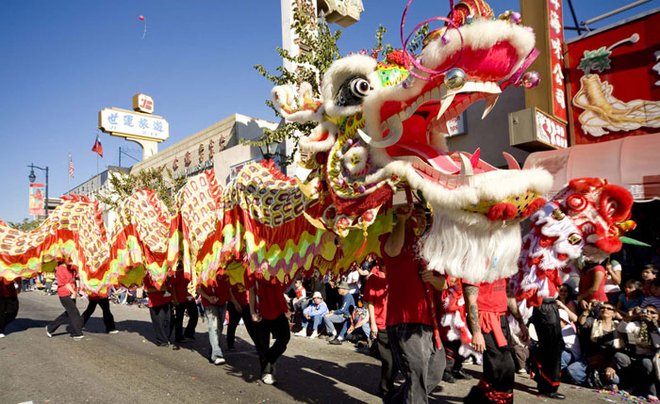Happy Chinese New Year - Year of The Rat!
Cool Facts about this Spring Festival and the Year of The Rat.
Jan 17, 2020Good fortune, wealth, and happiness—Three words that best describe what Chinese New Year is all about! Beginning on January 25th, 2020, Chinese people all over the world will reunite with family and friends, exchange gifts and good-luck wishes, eat carefully planned foods, and celebrate for days in red-splashed streets with dragons and lightshows. From the streets of China, South Korea, Vietnam, Singapore, Malaysia, Indonesia and Taiwan—to the Chinatown districts of Canada and America—people will carry on a centuries-long tradition brimming in sparkling mystery.
 Gong Xi Fa Cai is a popular Chinese New Year's greeting.
Gong Xi Fa Cai is a popular Chinese New Year's greeting.
The Legend
It all started with a treacherous monster named Nian. Every New Year, he would emerge from the deep sea and over the mountains to terrorize villages. Eventually the people discovered that by making loud noises, flashing bright lights, and decorating their villages in red, they could scare Nian and banish him back to the sea depths. To this day, people string up colorful decorations, bang on drums and hold noisy parades and festivals to keep the monster where he belongs—far away.
 Red lanterns are strung to scare Nian away.
Red lanterns are strung to scare Nian away.
The Calendar
Why does Chinese New Year, sometimes called the Spring Festival or Lunar New Year, fall on a different date every year? Because it begins on the first day of the Chinese calendar, which is based on phases of the moon, as opposed to our calendar, which relies on the sun. As a result, their year is slightly shorter—a lunar month is about two days shorter than one of our months. Chinese New Year usually starts between January 21st and February 20th every year. The festivities begin on the first day of the new year that a new moon happens.
 According to the Chinese zodiac, those born during the year of the rat are optimistic and friendly.
According to the Chinese zodiac, those born during the year of the rat are optimistic and friendly.
Metal Rats Rule in 2020
According to the Chinese calendar, 2020 marks the year of the rat. They use an animal zodiac with a 12-year cycle, so previous “rat” years are 1924, 1936, 1948, 1960, 1972, 1984, 1996 and 2008. Their zodiac says that people born during the year of the rat are liked by all because they are positive, cheerful and kind. On the downside, they’re stubborn, big spenders, and not always great communicators.
 In addition to the animal zodiac, the Chinese use the 5 elements to define each year.
In addition to the animal zodiac, the Chinese use the 5 elements to define each year.
So, what are “metal” rats? People born during a “rat” year who are also born during the year of metal. Chinese astrology also uses a 10-year cycle of heavenly stems. Each of the ten heavenly stems is associated with one of the five elements of wood, fire, metal, earth and water—2020 falls on a “metal” year. The elements are changed every two years.
 People plan for the festivities in advance. Here, they buy brightly-colored decorations in anticipation.
People plan for the festivities in advance. Here, they buy brightly-colored decorations in anticipation.
The Celebration: Cool Facts
 People exchange good-luck gifts like Mandarin oranges and gold coins.
People exchange good-luck gifts like Mandarin oranges and gold coins.
- Preparation for the festivities begins way in advance. Everywhere, people clean their houses to wash the “old” away and bring in good luck. They buy new clothes, food and decorations. They hang pictures of Gods on their front doors to scare away evil during this jovial time.
- The holiday lasts for 15 days, ending with the Lantern Festival marked by vibrant lanterns swaying between street buildings. During the lantern festival people release lanterns into the night sky, letting their past worries go with them and looking forward to the promise of the New Year.
 The lantern festival happens on the 15th day. Often, lanterns are released to signify letting go the "old."
The lantern festival happens on the 15th day. Often, lanterns are released to signify letting go the "old."
- On Chinese New Year’s Eve, families come together to eat an evening meal called the “reunion meal.” The visiting continues through the early days of the New Year festival.
- The Chinese will take around three to seven days off from work. They’ll go to festivals, dragon parades and martial arts performances.
- Chinese who live in Western countries visit Chinatowns to eat scrumptious food, exchange gifts, and watch fireworks and parades.
 Chinese New Year parade in Los Angeles.
Chinese New Year parade in Los Angeles.
- People use this time to also honor loved ones who have passed away.
- Family members exchange gifts of money in small red envelopes, called “hongbao” in the Mandarin language.
- Children get Mandarin oranges, sweets and coins. Sometimes the family dog gets a gift too!
- “Gong Xi Fa Cai!” “Gong Hey Fat Choy!” These mean “Wishing you a prosperous new year!” in Mandarin and Cantonese languages. Everywhere, people will exchange this greeting much like we do in saying Happy New Year.
 People exchange money as tokens of good luck in red envelopes called hongbao.
People exchange money as tokens of good luck in red envelopes called hongbao.
Food Takes On a Whole New Meaning.
 Dumplings are considered a good-luck food during the New-Year festivities.
Dumplings are considered a good-luck food during the New-Year festivities.
- During the Lantern Festival the Chinese celebrate by making veggie-filled dumplings out of sticky rice and eating them in a sweet soup.
- Foods and eating behaviors fall into two categories: Lucky and unlucky. Dumplings, spring rolls, oranges, dried fruit and sweets? They’re lucky. Candy boxes and little round shaped biscuits symbolizing gold? Also lucky. Long noodles will bring you luck because they symbolize a long life.
 A typical Chinese New Year feast.
A typical Chinese New Year feast.
- A huge bowl of raw fish salad with long noodles called “yusheng” appears on many tables on the seventh day of the New Year. It’s eaten surrounded by a circle of family and friends.
- The word “fish” means “abundant” for the Chinese, so many people eat more fish during the festival. However, it’s unlucky to eat too much of it and clean your plate. Leaving some of the fish uneaten leads to an abundance of food in the New Year.
- Definitely avoid using a knife or fire for your Chinese New Year’s meals—it’s bad luck with a capital B! Many people will prepare their food ahead of time to avoid this taboo.
 Friends and family eating yusheng.
Friends and family eating yusheng.
Other Things That Bring Bad Luck:
- Washing hair or clothes.
- Wearing black or white clothes.
- Wearing damaged clothes.
- Babies crying bring bad luck for the family.
- Sweeping. You’ll sweep away your luck!
 People may hang a pictures of Gods on their front doors to scare evil away during the festivities.
People may hang a pictures of Gods on their front doors to scare evil away during the festivities.
- Breaking tools.
- Certain words that imply death.
- Telling ghost stories.
- Giving gifts that are black or white.
- Giving clocks, watches or shoes. If you give watch, you’re telling your recipient that time is running out. Giving shoes tells her that you could walk away from the friendship. How rude!
- Giving gifts in uneven numbers. Always give gifts in pairs!
 Fireworks appear in the night sky all over the world during the Chinese holiday.
Fireworks appear in the night sky all over the world during the Chinese holiday.
Share With Kidzworld
What Chinese zodiac animal are you? Do you celebrate Chinese New Year? Tell Kidzworld!

































